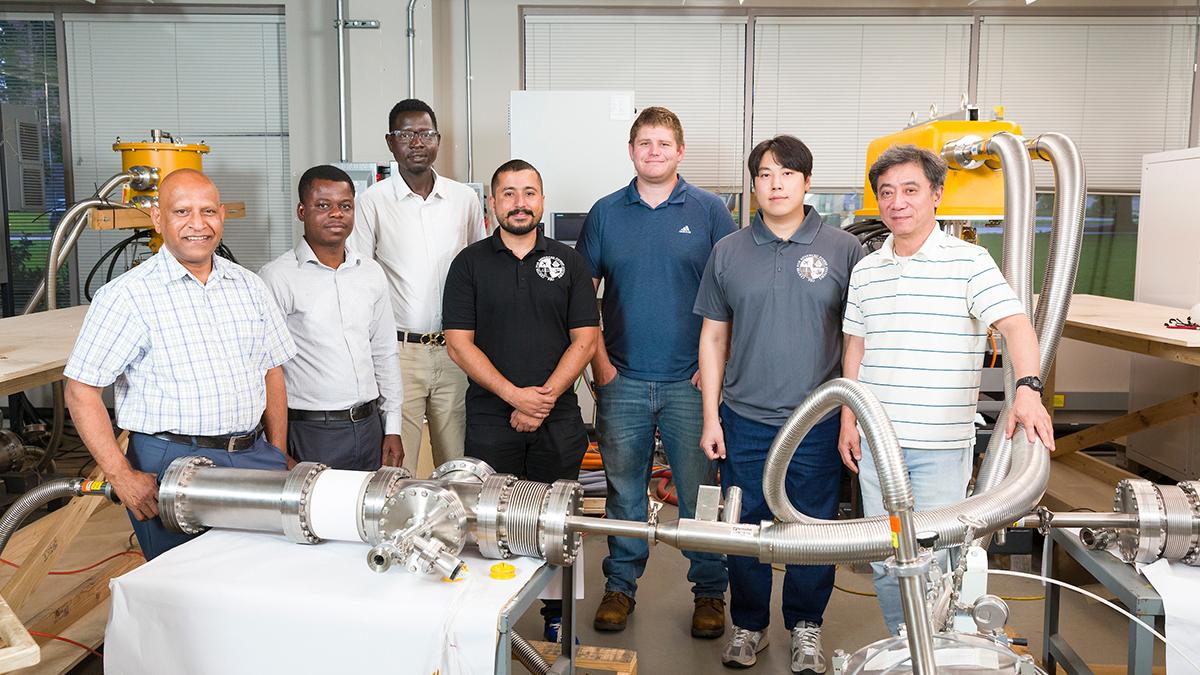
(L-R): Sastry Pamidi, Ph.D., MBA, David Sackey, Yai Pioth Yai Deng, Muhammad Tahir Mehmood Khan Niazi, Peter Cheetham, Ph.D., Youngjun Choi, Ph.D., and Chul Kim, Ph.D., pose with cryogenic equipment in the Center for Advanced Power Systems (CAPS) in Tallahassee, Florida on June 16, 2025. (Scott Holstein/FAMU-FSU College of Engineering)
College Represents Applied Superconductivity and Electric Aircraft Work at Global Engineering Event
FAMU-FSU College of Engineering students presented their research at the 2025 Cryogenic Engineering Conference (CEC) and International Cryogenic Materials Conference (ICMC) in Reno, Nevada, contributing to discussions on cryogenic materials science and thermal management systems.
The biennial conference brings together experts, scientists and engineers from around the world to share knowledge in cryogenic engineering and materials research. The event provided a platform for FAMU-FSU's doctoral students to present their work in areas relevant to electric aircraft propulsion systems and hydrogen power applications.
Faculty Leadership in Applied Superconductivity
Sastry Pamidi, chair and professor of electrical and computer engineering at FAMU-FSU, attended the conference and serves as associate director for the Center for Advanced Power Systems (CAPS). The college conducts cryogenics and cryogenic materials research through CAPS, the National High Magnetic Field Laboratory, and the Applied Superconductivity Center, which host multiple research programs in these developing fields.
“Seeing our graduate students giving compelling invited technical presentations at international conferences such as CEC-ICMC is rewarding,” Pamidi said. “Attending and presenting at prestigious international conferences provides students with exposure, recognition, networking opportunities and professional development. I thoroughly enjoyed the student presentations and the accolades they received at CEC-ICMC 2025.”
Three doctoral candidates from the college contributed to the conference’s technical program, each working on research with applications to sustainable energy systems.

Thermal Management for Electric Aircraft
YPY Deng, a second-year doctoral student in electrical engineering, delivered an invited presentation on cryogenic thermal management of power conversion systems for electric aircraft applications. This research addresses challenges in developing efficient propulsion systems for sustainable aviation technologies.
“The experience was amazing and insightful, allowing me to connect with top researchers and industry leaders,” Deng reflected. “It was an honor to represent the joint college, especially knowing our strong reputation in this research area.”
Hydrogen Energy Research
David Mensah Sackey, also a second-year doctoral student, presented his research on hydrogen as a sustainable energy source. His work contributes to the expanding field of hydrogen power systems, which are being developed as components of clean energy infrastructure for aerospace and other applications.
“Presenting at the conference was a privilege. I learned so much from fellow students and industry trailblazers, and I made valuable connections that will enhance my Ph.D. journey,” Sackey said.
Superconducting Power Distribution Networks
Muhammad Tahir Mehmood Khan Niazi, a fourth-year doctoral student, presented his research on developing cryogenic and superconducting power distribution networks for electric aircraft applications. His work focuses on integrating superconductivity technologies with aerospace engineering requirements.
“The experience was invaluable, both for sharing my research and the incredible insights I gained,” Niazi said. “It’s always an honor to represent the joint college on an international stage, especially since our college has a strong reputation for pioneering work in applied superconductivity.”
Niazi delivered both invited and contributed presentations, reflecting the scope of his research.
Professional Development and Industry Connections
The conference provided networking opportunities with industry professionals, creating collaboration and knowledge exchange opportunities. Students gained access to researchers and potential collaborators in academia and industry.
The Cryogenic Society of America, a not-for-profit technical organization supporting cryogenic engineering advancement, partnered in the conference organization.
Continued Research Focus
The FAMU-FSU College of Engineering students concluded their conference participation with new knowledge and connections to support their continued research in cryogenics. The college’s involvement in CEC-ICMC 2025 reflects its ongoing work in engineering education and research, particularly in areas related to sustainable technology development.
The 2025 conference demonstrated the college’s position in cryogenics, applied superconductivity and aerospace technologies research. The institution’s work in these areas positions students and faculty to contribute to sustainable energy systems and advanced manufacturing technologies.
The participation of joint college students at this international conference represents the college’s continued involvement in engineering research and technological development.
Editor’s Note: This article was edited with a custom prompt for Claude Sonnet 4, an AI assistant created by Anthropic. The AI optimized the article for SEO discoverability, improved clarity, structure and readability while preserving the original reporting and factual content. All information and viewpoints remain those of the author and publication. This disclosure is part of our commitment to transparency in our editorial process. Last edited: July 7, 2025.
RELATED ARTICLES
